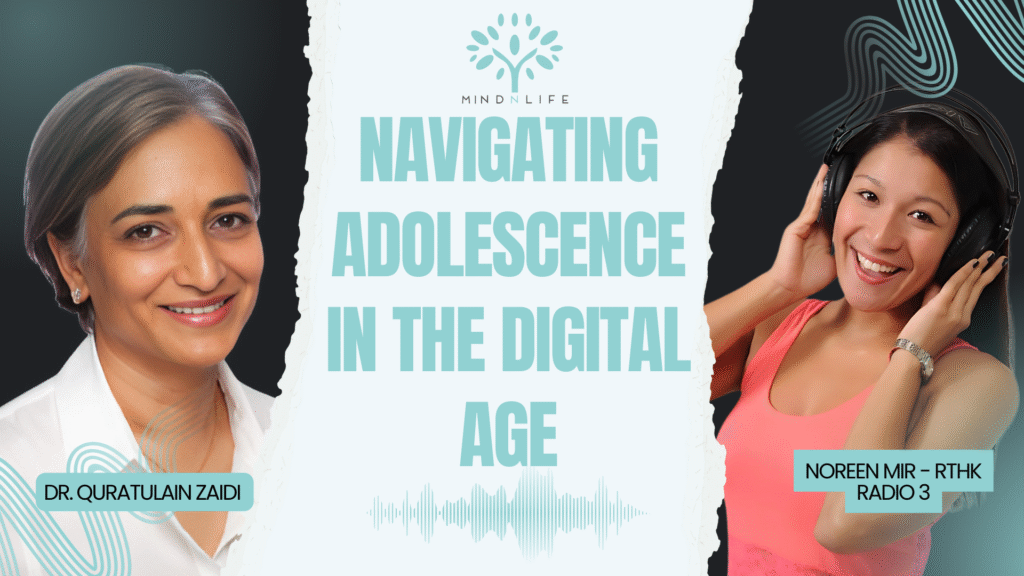If you tuned into Brunch with Noreen this morning, you would’ve heard an eye-opening conversation about adolescence in the digital age—a topic that’s becoming more urgent as young people face increasing pressures both online and offline.
Noreen Mir was joined by the ever-thoughtful and always insightful Dr. Quratulain Zaidi, a clinical psychologist who works with young adults and families. Together, they unpacked the many layered challenges teenagers face today, with a particular focus on young boys and the pressures of modern masculinity.
Inspired by the Netflix miniseries Adolescence—a gritty, hard-hitting portrayal of teenage life—Dr. Zaidi opened up about watching the show both as a parent and as a mental health professional. She admitted it was a heavy watch (and we don’t blame her), filled with raw depictions of violence, vulnerability and very real emotional struggles. But it was also a starting point—especially at home—for meaningful conversations.
“It was just interesting for us to watch as a family,” she said. “It wasn’t easy, but it sparked those important discussions.”
What Does Adolescence Look Like Today?
Dr. Zaidi didn’t mince words. Adolescence has never been a walk in the park, but in today’s landscape, with social media, unrealistic expectations, and the rise of influencers like Andrew Tate, teens—especially boys—are under pressure like never before.
Between figuring out who they are and where they belong, teens now juggle multiple identities: one online, one offline. Add academic stress, body image issues, and emotional confusion to the mix, and it’s no wonder anxiety and depression are rising.
She noted that many young boys are drawn to what’s known as the manosphere—a troubling corner of the internet pushing controversial (and often toxic) views on masculinity. Why? Because it gives them a sense of belonging, even if the message is damaging.
Emotional Vocabulary and Breaking Gender Stereotypes
One of the standout moments in the interview came when Dr. Zaidi addressed emotional expression in boys.
“If you ask young men how they feel, it’s often limited to just two emotions—‘I’m fine’ or ‘I’m angry’,” she said. “We need to give our boys more emotional vocabulary.”
She called for both fathers and mothers to model emotional openness and allow boys to feel without shame. Crying, frustration, sadness—none of it is ‘weak’ or ‘girly’. It’s human.
And she reminded us of something important: often, even well-meaning mums say things like “man up” or “be strong”—without realising the long-term damage those phrases can cause. The shift has to happen in both language and behaviour, she stressed.
Strength Redefined: What Does It Really Mean to ‘Be a Man’?
Another golden nugget from the conversation was around redefining strength and success.
What does it really mean to “be strong”? Is it about being tall, tough, stoic? Or is it about being resilient, kind, emotionally intelligent?
Dr. Zaidi challenged parents to start these conversations at home and stop assuming that kids will just “figure it out”. From noticing subtle changes in your child’s mood (even just through their eyes) to encouraging shared spaces for homework, it’s all about staying involved and present.
How Parents Can Support Adolescents in the Digital Age
Noreen also raised a powerful point about peer influence—and how difficult it can be to counter toxic messaging when it’s coming from a teen’s entire social circle. So what can parents do?
Dr. Zaidi’s advice: don’t leave a vacuum. Be part of your child’s online life. Talk to them. Watch what they’re watching. Discuss what’s going on in their world. And if you notice shifts in behaviour—withdrawal, irritability, obsession with certain figures—intervene early. Don’t wait for it to spiral.
“If you don’t fill the space, someone else will,” she warned.
Final Thoughts: Culture of Empathy Starts at Home
The interview closed with a much-needed reminder. Creating a culture of empathy at home isn’t about grand gestures—it’s about small, consistent acts. Show vulnerability. Model healthy emotional processing. And most importantly, keep the lines of communication wide open.
As Dr. Zaidi put it, “Open communication and shared spaces can help prevent predators—online or otherwise—from taking root.”
This conversation barely scratched the surface, and as Noreen said, we could easily do a part two. But even in 20 minutes, the message was clear: parenting today may be complex, but it starts with showing up, listening, and guiding—with compassion, not control.
If you missed the interview, click here to watch the full video or watch it below. And if you’re a parent, caregiver, or just someone who cares about the next generation—this one’s well worth a listen.




